
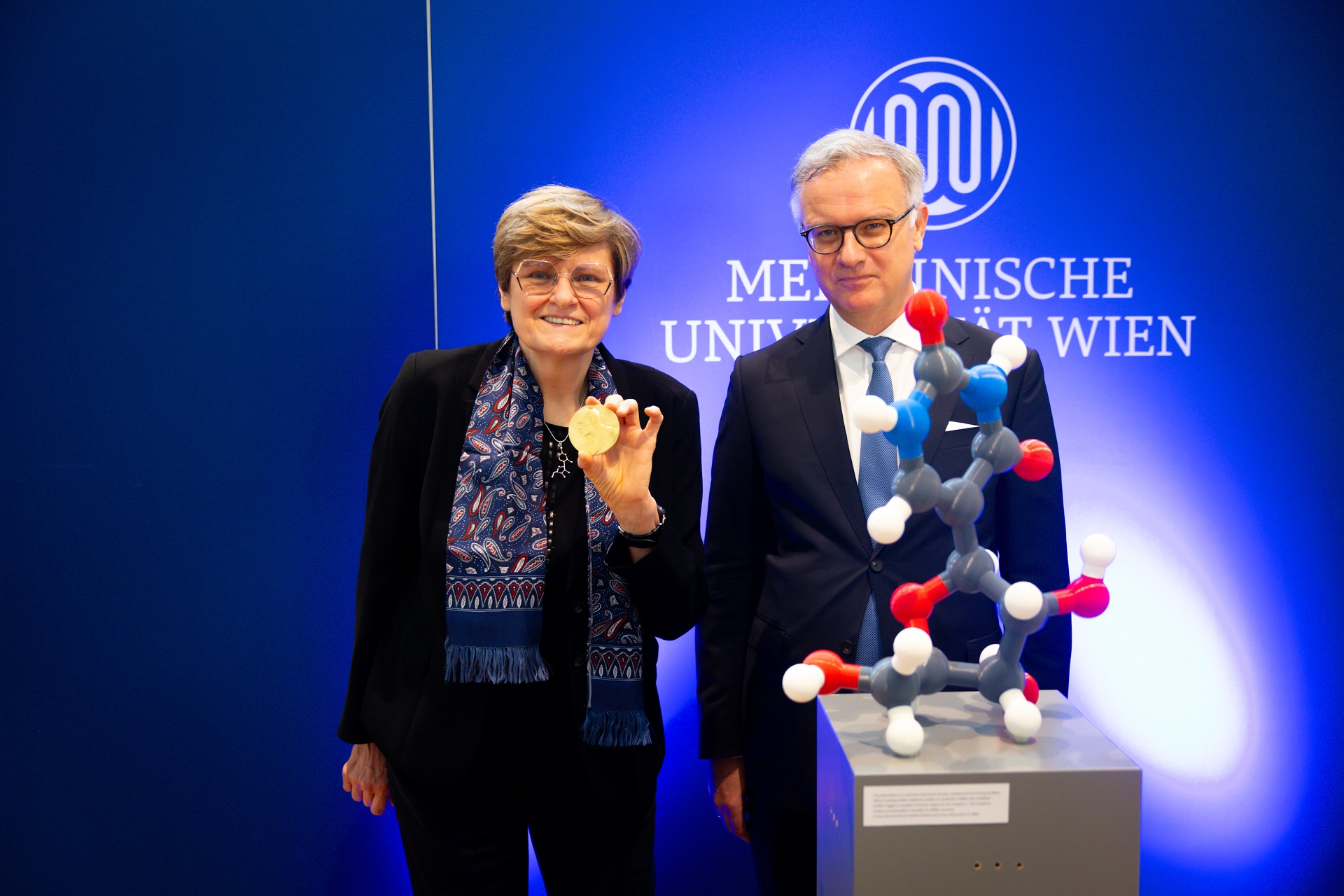
A captivating exhibition titled Forever Forward, celebrating the life and work of Katalin Karikó, has opened at the Josephinum, Vienna’s Museum of Medical History.
“The Josephinum is the historical gateway to medical science in Vienna, as well as a platform for dialogue and engagement with the public and decision-makers,” reads the introduction to the building that also houses the museum of the Medical University of Vienna. This iconic institution was the starting point for the series of events held on May 19, 2025, featuring Nobel laureate Katalin Karikó, professor at the University of Szeged. Titled A Forever Forward – Katalin Karikó, the exhibition set up in the Josephinum is complemented by a photo and roll-up display at the Collegium Hungaricum building in Vienna.
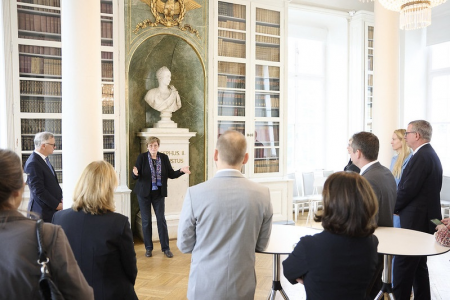
The Josephinum was founded in 1785 by Emperor Joseph II as a military surgical academy. Nobel laureate Katalin Karikó was welcomed in the ceremonial hall of the building by the leadership of the Medical University of Vienna, whose invitation also brought several leaders from the University of Szeged and prominent members of the Hungarian community in Vienna to the event.
Photo: © MedUniWien/Hörmandinger
During the opening ceremony of the Forever Forward exhibition on May 19, Professor Markus Müller, Rector of the Medical University of Vienna (Medizinische Universität Wien), which operates the museum, spoke about Katalin Karikó’s remarkable achievements. He praised her as a scientific icon and an extraordinary symbol of perseverance and dedication.
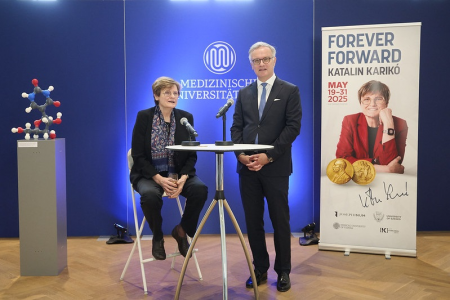
Pseudouridine is a common but little-known component of structural RNAs. A model of the molecule was created by the 3D Center of the University of Szeged (SZTE) for the exhibition on Katalin Karikó’s scientific work, set up at the Josephinum in Vienna. A roll-up banner promoting the exhibition—organized in cooperation between SZTE, the Klebelsberg Library of SZTE, MedUni Vienna, and the Josephinum—served as a backdrop for the Nobel laureate’s press conference, drawing attention to the display available on the ground floor of the Josephinum.
Photo: © MedUniWien/Hörmandinger
At the press conference marking the opening of the exhibition, Katalin Karikó, professor at the University of Szeged, noted that over 150 clinical trials are currently underway utilizing mRNA-based technologies. More than half of these trials focus on infectious diseases, while approximately 20 to 30 percent target various forms of cancer. Among the cancer therapies in development are approaches where mRNA encodes proteins for antibodies that help the immune system recognize cancer cells, or in certain cases, detect compounds they produce.
Professor Karikó emphasized the significant challenges inherent in cancer research. She illustrated this by comparing it to vaccine development for the coronavirus, which presents a clear target in the form of the spike protein. In contrast, many cancer cells lack such distinct surface markers – making targeted therapies far more complex.
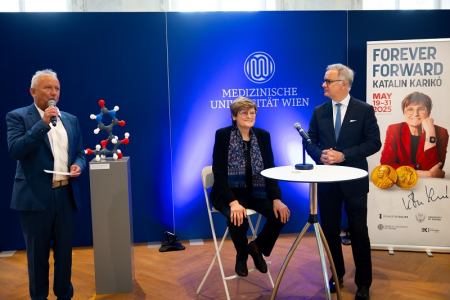
Photo: István Sahin-Tóth
When asked about her current projects, Professor Karikó shared that a new center dedicated to the development of antimicrobial and antifungal therapies had opened in Szeged just a week earlier. The establishment of the center was made possible largely through funding associated with the awards she has received. She also mentioned plans to initiate clinical research in the near future but noted, with characteristic humility, that she would prefer to speak about the details only once there are substantial developments to report.
Katalin Karikó emphasized that the recognition she has received offers a valuable opportunity to highlight the importance of science and the contributions of scientists. Reflecting on her career, she remarked that research is not for everyone – but for those who enjoy solving problems and engaging in deep, thoughtful analysis, it is the ideal path. So fulfilling, she added, that they might not even feel the need for a hobby. As she put it, “I never worked for someone else; I was always driven by my personal desire for scientific discovery.”
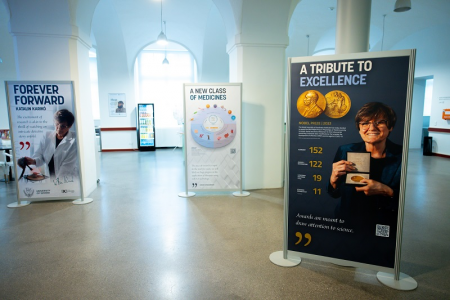
Photo: István Sahin-Tóth
In response to concerns that the Trump administration might withdraw funding for mRNA-related research programs in the United States, researcher Katalin Karikó emphasized that scientific progress in this field will continue regardless of political decisions. “Even if support is cut in the U.S., the research will continue – if not there, then in Europe,” she said, underscoring the resilient nature of scientific progress. She also stressed the crucial shared responsibility of the media and researchers to communicate scientific findings to the public in a clear, engaging, and accessible manner.
The exhibition, on view at the Josephinum until May 31, features a curated selection from the collection of the Klebelsberg Library at the University of Szeged. These materials – including photographs, documents, research-related artifacts, and awards – were donated by Katalin Karikó to her alma mater.
The displayed materials highlight the scientist’s early studies at her high school in Kisújszállás and at József Attila University of Szeged, one of the legal predecessors of the University of Szeged. Among the featured items is the Gusztáv Jermy Award, a scientific honor established by Katalin Karikó’s former high school (Móricz Zsigmond High School in Kisújszállás). She received this award in 1973, a year before it was awarded to Albert Szent-Györgyi.
Remarkably, Katalin Karikó preserved the herbarium – her personal collection of plants – she assembled during her university years. Among the specimens on display at the exhibition is a dried parsnip (Pastinaca sativa). Visitors can also view the original copy of her MSc thesis, together with her doctoral diploma, which she received in Szeged in 1983.
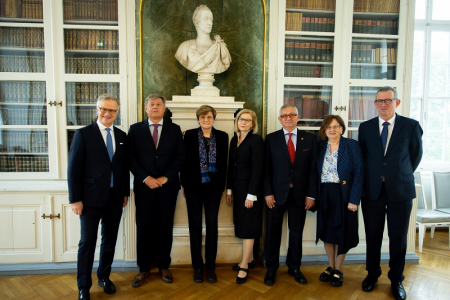
The Vienna events held in honor of Nobel laureate Katalin Karikó began at the Josephinum on May 19–20, 2025. Among those who gathered to welcome the world-renowned mRNA researcher were (from left to right): Professor Markus Müller, Rector of MedUni Vienna; Professor László Rovó, Rector of the University of Szeged; the honoree, Nobel laureate and University of Szeged professor Katalin Karikó; Edit Szilágyiné Bátorfi, Hungary’s Ambassador to Vienna; Professor György Lázár, Dean of the Szent-Györgyi Albert Faculty of Medicine at the University of Szeged; Professor Judit Oláh, Head of the Department of Oncotherapy at the Albert Szent-Györgyi Clinical Center; and Professor Péter Zakar, Vice-Rector for International and Public Affairs at the University of Szeged. Photo: István Sahin-Tóth
As part of the exhibition, photographs from the Szeged Biological Research Center evoke the early years of Professor Karikó’s distinguished scientific career. The exhibition also showcases one of her first photos with Drew Weissman, with whom she shared the 2023 Nobel Prize in Physiology or Medicine for their groundbreaking discoveries that paved the way for the development of mRNA-based vaccines.
Among the scientific instruments on display is a pipette once used by Katalin Karikó – similar to the one she donated to the Nobel Prize Museum in Stockholm – alongside several vials of the COVID-19 vaccine that brought her international acclaim. To further highlight her remarkable achievements, which have been recognized with over one hundred scientific honors, the exhibition also features the Wilhelm Exner Medal, awarded to her by the Austrian Federal Economic Chamber in 2021.
A short documentary film is also screened at the museum, featuring Katalin Karikó alongside Drew Weissman and Uğur Şahin, CEO of BioNTech SE, as they discuss the groundbreaking research that created the foundation for the development of mRNA technologies. In addition, a dedicated display panel provides an introduction to the fundamentals of mRNA technology and highlights its potential applications. The exhibition is further enriched by a multilingual virtual version, available in four languages (Hungarian, English, German, and French), offering a comprehensive overview of Katalin Karikó’s scientific journey.
With the Vienna exhibition open through June 28, plans are underway to take Forever Forward to other major European cities in the near future.
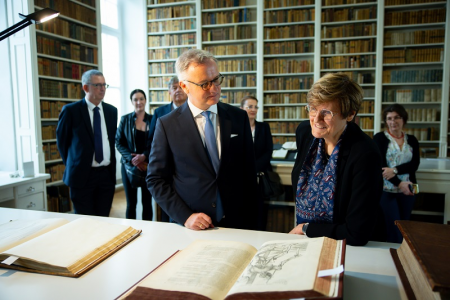
Katalin Karikó, accompanied by her hosts in Vienna and the delegation from the University of Szeged, also visited the Josephinum’s collection of rare books. Photo: István Sahin-Tóth
The delegation from the University of Szeged, which attended the exhibition opening at the Josephinum, were shown around the Rare Book Collection, home to a number of books of Hungarian significance related to the natural sciences and medicine. Led by the director of the Vienna Museum of Medical History, they explored the medical history collection, which includes, among other items, the handwashing basin used by Ignác Semmelweis – known as “the savior of mothers.”
During the visit, Professor Dr. György Lázár, Dean of the Albert Szent-Györgyi Medical School at SZTE, was given a tour of the facilities of the surgical workshop and cardiology center at the Medical University of Vienna. At the same time, discussions on prospective academic and research collaborations took place between SZTE representatives – Professor Dr. Péter Zakar, Vice-Rector for International and Public Relations, and Dr. Tamás Bene, Director for International and Public Relations – and Dr. Dipl.-Ing. Michaela Fritz, Vice-Rector for Research and Innovation at the Medical University of Vienna. The meeting highlighted shared interests and laid the foundation for potential future cooperation in medical education and research.
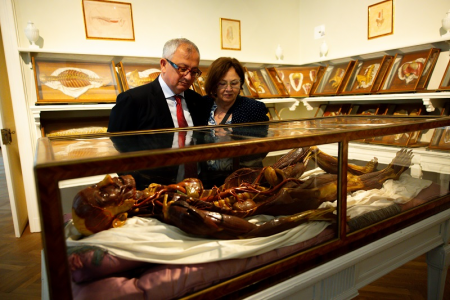
Professors György Lázár and Judit Oláh from the Szent-Györgyi Albert Faculty of Medicine at the University of Szeged visited the exhibitions at the Josephinum, the museum of the Medical University of Vienna. Organized by MedUni Vienna, they also took part in a professional visit to an institution related to their field of expertise.
Photo: István Sahin-Tóth
Source: MTI News Agency, SZTEinfo
Photo: István Sahin-Tóth


